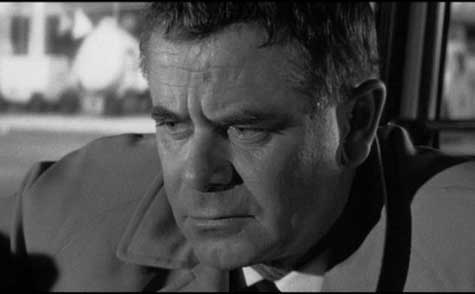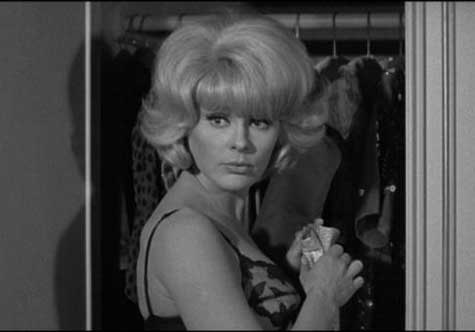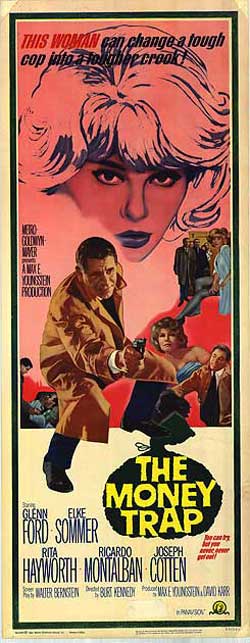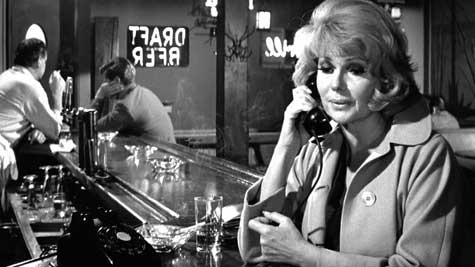
I’ve written about one of Lionel White’s novels here before (The Big Caper), and now I’ve got some thoughts about a film based on one of his books.
White is seen by many noir aficionados as a master of the heist story. Stanley Kubrick made the author’s 1955 novel Clean Break into the classic film noir The Killing (1956). Quentin Tarantino credited him as being an inspiration on his 1992 debut film Reservoir Dogs. But caper tales aren’t the only kind of stories White wrote, and The Killing isn’t the only example of a time a film director saw fit to adapt one of his novels for the big screen. Jean-Luc Godard’s avant-garde title Pierrot le fou (1965) is loosely based on White’s 1962 novel Obsession. And there’s an odd, good 1968 movie called The Night of the Following Day that stars Marlon Brando and Rita Moreno, that’s from White’s 1953 book The Snatchers. In addition, there’s another heist film, 1957’s The Big Caper (1957), which shares the title of the White story (1955).
Another time a Lionel White novel got made into a film happened when his 1963 book The Money Trap served as the basis of the same-named film from 1965. And this movie is the one I want to bend your ears about now. Because while The Money Trap, which was directed by Burt Kennedy, may not be not on the same quality tier as The Killing, or as groundbreaking as Pierrot le fou, it’s a hell of a good crime film, and it appears to be all but forgotten, if it was ever much known in the first place.
The first striking thing about The Money Trap is its heavy-hitting cast: among the stars are Glenn Ford, Elke Sommer, Joseph Cotten, Rita Hayworth, and Ricardo Montalban. The second notable aspect of the film is its compelling premise. The Money Trap involves crime, love, friendship, murder, jealousy, etc., but it is ultimately about, well, money. Ford, who excelled at portraying troubled cops (see The Big Heat), is Joe Baron, a New York homicide detective. All’s going well enough in Baron’s work; it’s his home life where his struggles mainly exist. Baron loves his beautiful, smart wife Lisa (Sommer), and she seems to love him back. The problem is that Lisa has expensive tastes, likes things that can’t be purchased with a policeman’s salary. That’s no problem for her, because she has a trust fund and can buy for herself anything her husband can’t get her. This gnaws at Baron, hurts his ego; he wishes he could take care of his wife and himself without her money coming into it. That’s an old-fashioned, sexist mindset for sure, one that might keep some from feeling sympathetic to Baron’s woes. But, you know, the story was written and filmed at a time when the general expectation was that a man would be the breadwinner in a marriage, so just roll with me here and take the story at face value.

 Another problem for Baron involving his wife is that she has a male friend who’s always hanging around, and this guy is a debonair sort and he has the kind of cash flow more in line with Lisa’s tastes. So you get a sense of where Baron’s head and heart are and you can probably understand his motivation in the story’s big turning point. This comes when Baron and his partner (Montalban) are called to look into a killing that happened in the home of a wealthy doctor who works out of his residence. The doc, portrayed by Cotten, caught a heroin addict trying to rob his home safe and he shot the intruder dead. The big brass at police headquarters sees this as an open and shut case, and they don’t want Baron and his pal to bother the rich doctor much. But the two detectives get interested, anyway, for a couple of reasons. For one, they wonder if there might have been some connection between the deceased junkie and the doctor, some reason why the victim singled out the medic’s home as a place to rob. Second, they learn that there is a large sum of cash on hand in the house. I don’t want to go much deeper into plot description here, but suffice to say that the two cops quickly come to realize that the “respectable” doctor is actually part of an illegal drug smuggling syndicate, and that the addict he killed was someone who worked for him in those kinds of doings. That knowledge, and the matter of the plentiful cash in the doctor’s safe, leads the pair to have a dangerous lightbulb moment: they’re going to do what the dead man tried and failed to do, going to rob the doc’s home and get that money. Baron’s partner has his own reasons for wanting the dough, and we already know why Baron covets it.
Another problem for Baron involving his wife is that she has a male friend who’s always hanging around, and this guy is a debonair sort and he has the kind of cash flow more in line with Lisa’s tastes. So you get a sense of where Baron’s head and heart are and you can probably understand his motivation in the story’s big turning point. This comes when Baron and his partner (Montalban) are called to look into a killing that happened in the home of a wealthy doctor who works out of his residence. The doc, portrayed by Cotten, caught a heroin addict trying to rob his home safe and he shot the intruder dead. The big brass at police headquarters sees this as an open and shut case, and they don’t want Baron and his pal to bother the rich doctor much. But the two detectives get interested, anyway, for a couple of reasons. For one, they wonder if there might have been some connection between the deceased junkie and the doctor, some reason why the victim singled out the medic’s home as a place to rob. Second, they learn that there is a large sum of cash on hand in the house. I don’t want to go much deeper into plot description here, but suffice to say that the two cops quickly come to realize that the “respectable” doctor is actually part of an illegal drug smuggling syndicate, and that the addict he killed was someone who worked for him in those kinds of doings. That knowledge, and the matter of the plentiful cash in the doctor’s safe, leads the pair to have a dangerous lightbulb moment: they’re going to do what the dead man tried and failed to do, going to rob the doc’s home and get that money. Baron’s partner has his own reasons for wanting the dough, and we already know why Baron covets it.
An important character, in both the book and film, is the dead heroin addict’s former lady friend, Rosalie (last name Kenny in the film and Carver in the book). Played wonderfully by Hayworth in the film, she gives Baron a lot of the information that helps him understand the former associations between the dead man and the doctor. She also makes it known that the doctor is after her and wants her to flee town. In the movie, this woman also happens to be an ex-lover of Baron’s. That’s not the case in the novel, but in both instances Baron is sympathetic to, and charmed by, her in the moment. Hayworth’s character works as a cocktail waitress, one who is equally sexy and modest: a salt of the earth woman who is beautiful and who could be fully pleased by the kind of lifestyle Baron’s earnings can afford. Baron’s new interactions with her occur at a time when he’s about had it with his wife and her upscale desires and her slick boyfriend. Baron feels pulled to Rosalie and she needs him now. And meanwhile there’s the matter of Baron’s and his buddy’s plans to rob the doctor’s house. How’s that for a set of tension-making circumstances?

White’s novel that this movie comes from is excellent. If I hadn’t already covered one of his books for my Lost Classics of Noir series here, I’d be tempted to write about it for that. Noir fiction heads should read it, if they haven’t already. And anyone who likes a fine crime film/troubled love story/classic movie with the likes of Ford, Hayworth, Cotten, Sommer, and Montalban in its cast, should look up this film and thank me after.
Brian Greene's short stories, personal essays, and writings on books, music, and film have appeared in more than 20 different publications since 2008. His articles on crime fiction have also been published by Crime Time, Paperback Parade, Noir Originals, and Mulholland Books. Brian lives in Durham, NC with his wife Abby, their daughters Violet and Melody, their cat Rita Lee, and too many books. Follow Brian on Twitter @brianjoebrain.
See all posts by Brian Greene for Criminal Element.

The prices of cryptocurrencies can be volatile, which makes this type of investing likely a poor choice for conservative investors. If you are willing to assume greater risk as an investor, then investing in one or more cryptocurrencies may be right for you. Many investors are nonetheless attracted to the potential upside of investing in crypto. If you decide to invest, it’s important to carefully research any digital coin before buying it. Pay attention to transaction fees when making crypto purchases because these fees can vary widely among currencies.